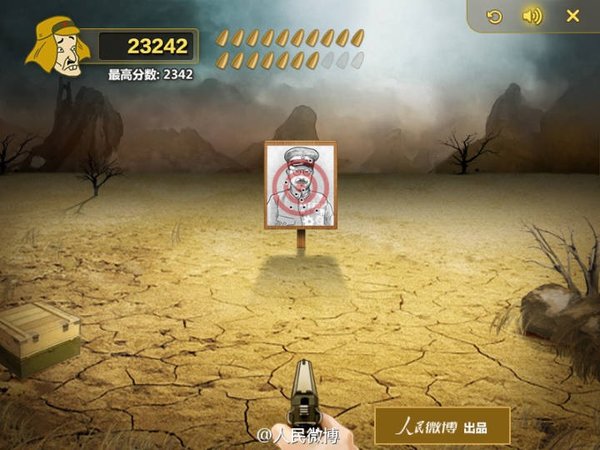An official Chinese news outlet that has revealed an online game on Thursday, February 27, 2014, which requires the players to shoot Japanese war criminals. The game is likely to please the Chinese nationalists but it may only fuel the tension between Beijing and Tokyo.
The move came the same day that China’s top legislative body, the Standing Committee of the National People’s Congress, ratified two new national days: September 3rd to mark the defeat of Japan in the Second World War and December 13th to commemorate the victims of the Nanjing Massacre of 1937—Japanese military went on a murderous rampage in the city that lasted six weeks.
The game was launched by People’s Daily Online Weibo—a microblog that is affiliated with the newspaper aligned with the Communist Party. The game is titled Shoot the Devils, meaning the Japanese, which “Japanese Devils,” is a common slur among the Chinese. The game features an offensive caricature of a Japanese soldier.
The game is a first person shooter game and it has the players fire a handgun at one of the 14 Japanese soldiers who were convicted as Class A war criminals after the war. During the game, players will hear a popular Chinese military tune playing in the background. The 14 Japanese soldiers are the same men who are now honored at the Yasukuni Shrine in Japan. The game makes the player well aware of this fact as they choose their targets. The selection screen includes biographies for each target and describes the role they played during the war.
The creator of the game stated that the purpose of the game was to “expose the war crimes of the Japanese invaders,” and allow players to “forever remember history” through a popular game form. A representative for People’s Daily Online Weibo declined to comment when reached by telephone. The website set up a similar game in January in which the targets are “corrupt officials.”
The game is released when tension is heightened between China and Japan—nations who have the world’s second and third largest economies—are running high. The Chinese often accuse Japan of not showing enough contrition for its wartime past and reacted angrily last December when Prime Minister Shinzo Abe of Japan visited the Yasukuni Shrine. The shrine commemorates 2.5 million Japanese war casualties, which include the 14 Class A war criminals.
The NY Times reports the two countries are also knee deep in a territorial dispute over a cluster of uninhabited islands in the East China Sea, called Diaoyu by Beijing and the Senkaku by Tokyo.
Regional tensions grew last November after Beijing declared an air defense identification zone in the East China Sea, which Japan and their ally, the United States, have refused to recognize. Under the rules initiated by China, any aircraft entering the zone must report its flight plan to the Chinese authorities and follow their instructions.
Beijing hasn’t ruled out establishing a similar zone in the South China Sea where their territorial claims overlap those of several Southeast Asian countries.
During the monthly new briefing, a Chinese Defense Ministry spokesperson, Yang Yujun, defended China’s rights to establish such zones. Yujun also stated that whether it would create the rules in the South China Sea would depend on the “extent of threat.” He accused “right-wing forces in Japan” of “again and again hyping up news” of China’s intent of an air defense identification zone in the region.
